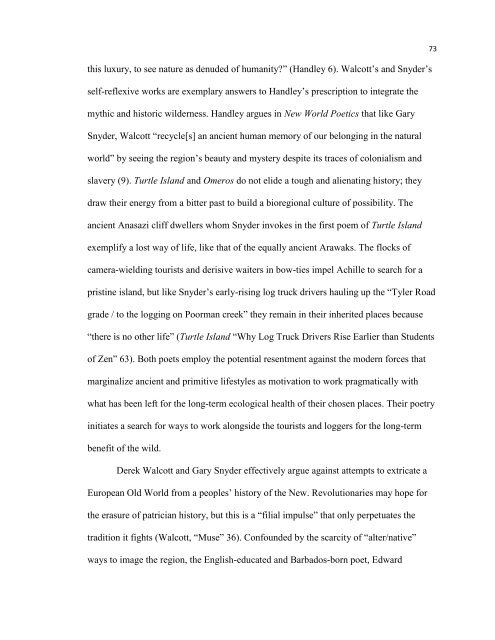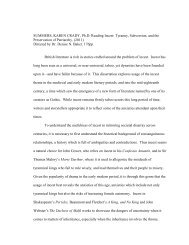RE-INHABITING THE ISLANDS - The University of North Carolina at ...
RE-INHABITING THE ISLANDS - The University of North Carolina at ...
RE-INHABITING THE ISLANDS - The University of North Carolina at ...
You also want an ePaper? Increase the reach of your titles
YUMPU automatically turns print PDFs into web optimized ePapers that Google loves.
this luxury, to see n<strong>at</strong>ure as denuded <strong>of</strong> humanity?‖ (Handley 6). Walcott‘s and Snyder‘s<br />
self-reflexive works are exemplary answers to Handley‘s prescription to integr<strong>at</strong>e the<br />
mythic and historic wilderness. Handley argues in New World Poetics th<strong>at</strong> like Gary<br />
Snyder, Walcott ―recycle[s] an ancient human memory <strong>of</strong> our belonging in the n<strong>at</strong>ural<br />
world‖ by seeing the region‘s beauty and mystery despite its traces <strong>of</strong> colonialism and<br />
slavery (9). Turtle Island and Omeros do not elide a tough and alien<strong>at</strong>ing history; they<br />
draw their energy from a bitter past to build a bioregional culture <strong>of</strong> possibility. <strong>The</strong><br />
ancient Anasazi cliff dwellers whom Snyder invokes in the first poem <strong>of</strong> Turtle Island<br />
exemplify a lost way <strong>of</strong> life, like th<strong>at</strong> <strong>of</strong> the equally ancient Arawaks. <strong>The</strong> flocks <strong>of</strong><br />
camera-wielding tourists and derisive waiters in bow-ties impel Achille to search for a<br />
pristine island, but like Snyder‘s early-rising log truck drivers hauling up the ―Tyler Road<br />
grade / to the logging on Poorman creek‖ they remain in their inherited places because<br />
―there is no other life‖ (Turtle Island ―Why Log Truck Drivers Rise Earlier than Students<br />
<strong>of</strong> Zen‖ 63). Both poets employ the potential resentment against the modern forces th<strong>at</strong><br />
marginalize ancient and primitive lifestyles as motiv<strong>at</strong>ion to work pragm<strong>at</strong>ically with<br />
wh<strong>at</strong> has been left for the long-term ecological health <strong>of</strong> their chosen places. <strong>The</strong>ir poetry<br />
initi<strong>at</strong>es a search for ways to work alongside the tourists and loggers for the long-term<br />
benefit <strong>of</strong> the wild.<br />
Derek Walcott and Gary Snyder effectively argue against <strong>at</strong>tempts to extric<strong>at</strong>e a<br />
European Old World from a peoples‘ history <strong>of</strong> the New. Revolutionaries may hope for<br />
the erasure <strong>of</strong> p<strong>at</strong>rician history, but this is a ―filial impulse‖ th<strong>at</strong> only perpetu<strong>at</strong>es the<br />
tradition it fights (Walcott, ―Muse‖ 36). Confounded by the scarcity <strong>of</strong> ―alter/n<strong>at</strong>ive‖<br />
ways to image the region, the English-educ<strong>at</strong>ed and Barbados-born poet, Edward<br />
73
















